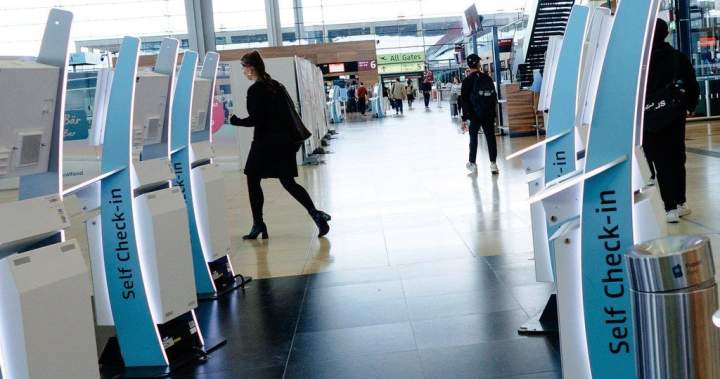Fallout from a cyberattack that affected check-in systems at several European airports extended into a second full day on Sunday, as passengers faced dozens of cancelled and delayed flights — and the impact poised to worsen for at least one major airport.

Brussels Airport, seemingly the hardest hit, said it asked airlines to cancel nearly 140 departing flights scheduled for Monday because a U.S.-based software system provider “is not yet able to deliver a new secure version of the check-in system.” The airport said 25 outbound flights were cancelled on Saturday and 50 on Sunday.
Starting late Friday, airports in Brussels, London and Berlin were hit by disruptions to electronic systems that snarled up check-in and sent airline staffers trying options like hand-writing boarding passes or using backup laptops. Many other European airports were unaffected.
The cyberattack affected software of Collins Aerospace, whose systems help passengers check in, print boarding passes and bag tags, and dispatch their luggage. The U.S.-based company on Saturday cited a “cyber-related disruption” to its software at “select” airports in Europe.
Story continues below advertisement
It was not immediately clear who might be behind the cyberattack, but experts said it could turn out to be hackers, criminal organizations, or state actors.

Get breaking National news
For news impacting Canada and around the world, sign up for breaking news alerts delivered directly to you when they happen.
The European Commission — the executive branch of the 27-nation European Union — said that aviation safety and air traffic control were unaffected. There was currently no indication of a widespread or severe attack, while the origin of the incident remained under investigation, it added.
Half of Monday’s flights from Brussels Airport cancelled
More on World
More videos
While departure boards for London’s Heathrow and Berlin’s Brandenburg airports were showing signs of smoother arrivals and departures on Sunday, Brussels Airport was still facing considerable issues.
Brussels Airport said in an email Sunday that it had asked airlines to cancel half of the 276 scheduled departing flights on Monday, “because Collins Aerospace is not yet able to deliver a new secure version of the check-in system.” Cancellations and delays will continue as long as manual check-in is necessary, it said.
RTX Corp., the parent company of Collins Aerospace, did not immediately respond to two emails Sunday seeking comment.
Trending Now

Here’s what Jimmy Kimmel said about the Charlie Kirk shooting

California bans mask use for most law enforcement officers during operations
On Saturday, the aviation and defense technology company said in a statement that it was working to resolve the issue: “The impact is limited to electronic customer check-in and baggage drop and can be mitigated with manual check-in operations.”
Story continues below advertisement
Brussels Airport said it nonetheless was able to maintain 85 per cent of scheduled departures over the weekend thanks to the deployment of extra staff by airport partners “and the fact that self bag drop and online check-in are still operational.”
The cyberattack affected only computer systems at check-in desks, not self-service kiosks, airport spokesperson Ihsane Chioua Lekhli said, and teams were turning to alternative backup systems and pulling out laptop computers to help cope with the impact.
The airports advised passengers to check the status of their flights before traveling to the airports, and using alternative check-in methods.
“Work continues to resolve and recover from Friday’s outage of a Collins Aerospace airline system that impacted check-in,” a Heathrow statement said. “We apologize to those who have faced delays, but by working together with airlines, the vast majority of flights have continued to operate.”
A rolling message Sunday on the Brandenburg Airport’s web page said: “Due to a systems outage at a service provider, there are longer waiting times. Please use online check-in, self-service check-in and the fast bag drop service.”
© 2025 The Canadian Press

